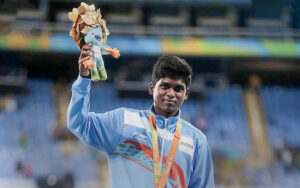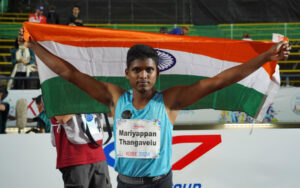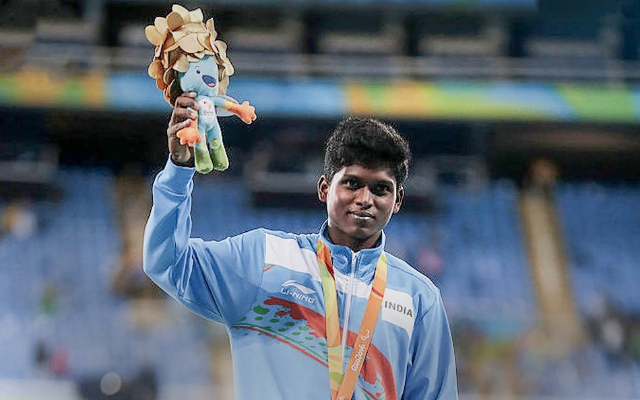
The hype over 84 Indian athletes who will compete at the Paris Paralympics, starting on August 28 is justified. They have trained very hard and expectations of medals in the 25-plus region over the next fortnight is a realistic one. Not only have the athletes themselves spoken about it, Paralympic Committee of India (PCI) President Devendra Jhajharia has also stressed the results will be good.
Despite the Covid-19 pandemic raging in Tokyo three years ago, the Indians won a historic 19 medals at the Paralympics. It was defining, as the able-bodied athletes had won seven medals in the Tokyo OIympics, headlined by Neeraj Chopra’s javelin gold medal.
For those not conversant with Para sports, its classification and how India started doing well in these Games, one must rewind to Rio 2016. PV Sindhu’s silver medal and Sakshi Malik’s bronze medal in wrestling was all India had to show in the Summer Games. Yet, one man who caught the attention of the nation a few weeks later was an unassuming boy from Salem, Tamil Nadu, Mariyappan Thangavelu.
Unlike today, when there is a fair amount of information available on Indian Para athletes, how and where they have trained and also a presence in social media, when Thangavelu and Varun Singh Bhati from Uttar Pradesh won gold and silver in the T42 category of high jump, it was big news. Eight years back, Para sports got little mention in the media. Typical stories of who Thangavelu was and search on Google threw up just a few pages.
For those who decided to reach out to the shy champion, his story of battling adversity was an emotional one. Yes, back home in Salem and a few more districts of Tamil Nadu, Thangavelu got good media coverage. His medal was defining and important in many ways as after the 2004 Athens Paralympics, India did not achieve good results in the next two editions in 2008 Beijing and 2012 London. Rio and the historic Maracana Stadium was defining for Thangavelu and India.
For the Latest Sports News: Click Here

The way the diminutive boy approached the high jump ‘take-off’ point and executed the Fosbury flop had left people in awe. Thangavelu’s gold medal effort of 1.89 metres, approximately six feet and three inches had created a flutter. Mariyappan was just nine years of age, when a heavy vehicle ran over his right leg. It led to stunted growth. Yet, the boy did not lose heart and faith. His school physical education teacher in the small city of Salem, Tamil Nadu encouraged him to compete and the champion mindset was instilled.
For those who watched him compete in Rio, the 30-second effort resulting in gold and glory was kind of addictive. His approach to high jump was simple and eye-catching. How he turned disability into ability can be understood by watching that video. “I never viewed myself as an athlete with a disability. I had the courage to compete with the normal athletes as well,” said Mariyappan Thangavelu on return to India in 2016. He was timid as he did not speak good English but was articulate enough to stress in Tamil, a Para athlete doesn’t not want sympathy but support.
Having kept in touch with him for many years, what Thangavelu did was spur many more in Tamil Nadu with disability to take up sports. Success was heady when he started getting cash awards and heavy rose garlands weighed down his neck. National awards also came his way. When he visited the Rashtrapati Bhawan to receive his Khel Ratna from the President of India four years ago, Thangavelu still hid from the media.
Why? He thought the media was interested in only meeting able-bodied athletes and did not want to hear stories from Para athletes. “I come from a small town and am not used to facing the big media. If my medal can spur a few more athletes to win medals in the Paralympics and make the nation proud, I will be happy,” he told this writer after collecting his Khel Ratna. There was one more reason why Thangavelu was avoiding the media as well. In 2017, his name had been dragged into a controversy where he was allegedly involved in a car accident, resulting in the death of a bike rider. There were ‘spicy’ stories on Thangavelu in the media and all of a sudden, he had to hide his face. Maybe, that was the reason why he wanted to stay away from the limelight.
On the flight to Tokyo for the Paralympics, Thangavelu was very happy. He was designated as flag-bearer for the opening ceremony. Unfortunately, another athlete he was sitting next to on the flight had tested positive for the dreaded Novel Coronavirus and the gold medallist from Rio was placed in quarantine. That other athletes like Avani Lekhara grabbed headlines is a different story. And yes, Thangavelu won a silver as well in Tokyo, in the T63 high jump category, a different classification from Rio. If he wins a medal in Paris as well, it will be a hat-trick!
And yes, as Thangavelu had broken the stereo-type, even a film in Tamil was made on him, directed by Aishwarya Dhanush.
Also Read: Remembering Sven-Goran Eriksson, architect of England’s greatest win




